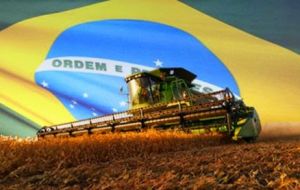MercoPress. South Atlantic News Agency
US Dept of Agriculture studying Brazil's success as an agricultural powerhouse
 In recent years Brazil has risen to the number one position as an exporter of soybeans.
In recent years Brazil has risen to the number one position as an exporter of soybeans.  The combined output of Brazil and its neighbors, Argentina and Paraguay, is challenging the United States’ position as the world’s leading supplier of corn.
The combined output of Brazil and its neighbors, Argentina and Paraguay, is challenging the United States’ position as the world’s leading supplier of corn. Over the last 25 years, the US farmer has become increasingly aware of the impact of South American agricultural output on the global supply of grains and oilseeds. For example, in recent years Brazil has risen to the number one position as an exporter of soybeans.
Further, the combined output of Brazil and its neighbors, Argentina and Paraguay, is challenging the United States’ position as the world’s leading supplier of corn.
According to a paper from the US Department of Agriculture, Brazil is unique in that it has a relatively stable agricultural output trend due to improving production techniques, and in most years, abundant rainfall for production of various crops. The climate and cropping patterns are behind the increases in agricultural production, which were made possible by the shift of production into regions less prone to drought. There is also the potential for expansion into untapped lands, although infrastructure and land ownership issues are a limiting factor. Meantime, thanks to ample rainfall and land resources enjoyed by producers, Brazil has the potential to become an agricultural powerhouse for years to come.
The in-country perspective of changing markets is being evaluated and the impacts that improved infrastructure and other factors could have on production and exports.
During the Agricultural Outlook Forum session Agricultural Production in Brazil: “Adapting to a Resilient Climate”, moderator Robert Tetrault with the USDA Foreign Agricultural Service examined how changing cropping practices have allowed producers in Brazil to take full advantage of favorable climate conditions to maximize agricultural production, and what role Brazil may play on global markets in the future.
Mark Brusberg, Deputy Chief Meteorologist for USDA’s Office of the Chief Economist, focused on Brazil’s climate and cropping patterns, highlighting the shift of agricultural production into regions less prone to drought.
These changes in land use and land cover have been rapid and sometimes difficult to quantify. Douglas Morton of NASA Goddard described some of the innovative techniques used to track changes in land use for the purpose of identifying agricultural production and the potential for expansion. Clay Hamilton the Agricultural Counselor of Brasilia is providing his perspective on the impacts that improved infrastructure and other factors could have, not only on local markets, but in elevating Brazil’s position as a leading exporter of grains and oilseeds.




Top Comments
Disclaimer & comment rules-

-

Read all commentsInteresting. Lack of rainfall in parts of the U.S. has been a very real problem in recent years.
Jan 16th, 2016 - 01:24 pm 0During the last 25 years, more or less, the agribusiness in Brazil has performed pretty well - note : it is in the hands of the private sector - and for quite some time has been the largest single contributor to export revenues.
Jan 16th, 2016 - 08:53 pm 0Commenting for this story is now closed.
If you have a Facebook account, become a fan and comment on our Facebook Page!